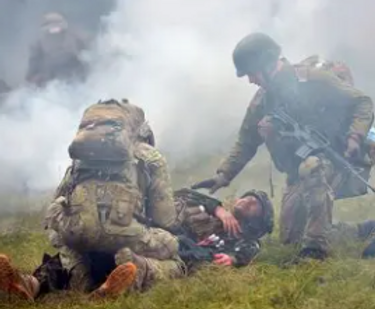

FREC 3 & 4 MEDICAL TRAINING
FREC 3 ,4 & MEDICAL TRAINING
FREC 3 & 4 Medical Training
At Forces Protection Group, we deliver accredited First Response Emergency Care (FREC) Level 3 & 4 courses, designed to prepare candidates to manage medical emergencies in both civilian and hostile environments. Our training is led by former Special Forces, Royal Marines, and Army veterans with extensive operational and medical experience, ensuring every lesson is grounded in real-world application. These courses are recognised within the security and medical industries as the benchmark for frontline responders and are also widely accepted as the standard for those working in close protection, high-risk environments, and emergency response roles. “We are able to facilitate customised training programmes within the UK, Ireland, and at global locations, depending on the nature of the course selected.
FREC Level 3 – Course Overview
FREC 3 provides learners with the skills, knowledge, and confidence to respond to a wide range of pre-hospital emergencies. It is ideal for security professionals, event medics, and those requiring a recognised qualification for SIA licensing in close protection.
Key Syllabus Includes:
-
Roles and responsibilities of the first responder
-
Patient assessment and vital signs monitoring
-
Airway management, oxygen therapy, and resuscitation (CPR/AED)
-
Management of catastrophic bleeding (tourniquets, haemostatic agents, wound packing)
-
Trauma management: fractures, burns, head, neck, and spinal injuries
-
Shock recognition and treatment
-
Medical emergencies (asthma, diabetes, epilepsy, cardiac arrest, anaphylaxis)
-
Casualty handling, triage, and evacuation techniques
Duration: Typically 5–7 days (depending on delivery format)
FREC Level 4 – Course Overview (CAN BE DELIVERED ON REQUEST)
FREC 4 builds on Level 3 and is aimed at those progressing towards professional pre-hospital care roles or working in high-risk environments where advanced trauma management is required. This qualification bridges the gap towards paramedic-level training.
Key Syllabus Includes:
-
Advanced patient assessment and management
-
Advanced airway management techniques
-
Analgesia and pain management protocols
-
Enhanced trauma care, including blast and ballistic injuries
-
Medical incident management in high-threat environments
-
Monitoring and managing deteriorating patients
-
Major incident response and multi-casualty scenarios
-
Advanced casualty evacuation procedures under stress
Duration: Typically 5–7 days (following FREC 3)
Why Train with Forces Protection Group?
-
Instructors with real-world experience: All trainers are former SF, Royal Marines, and Army veterans with operational deployments worldwide.
-
Realistic training scenarios: Practical, hands-on simulations that replicate the pressures of medical emergencies in both urban and hostile settings.
-
Industry-recognised qualification: Both FREC 3 and FREC 4 are Ofqual-regulated, meeting industry standards for professional responders.
-
Career progression: These courses are essential stepping-stones toward advanced medical qualifications, paramedic training, and employment within the close protection and security industry.
-
Medical Training with Forces Protection Group
-
At Forces Protection Group, we deliver accredited medical training from First Aid at Work (FAAW) through to FREC Level 3 & 4, ensuring students gain life-saving skills that are relevant, practical, and professionally recognised. All our courses are taught by instructors with extensive Special Forces, Royal Marines, and Army experience, bringing real-world operational knowledge into every lesson.
-
First Aid at Work (FAAW)
-
This qualification is designed for individuals who need to be workplace first aiders. It provides essential knowledge and practical skills to handle common medical emergencies safely and effectively.
-
Syllabus Includes:
-
Roles & responsibilities of a first aider
-
Assessing an incident and patient
-
Unconscious casualty management (including recovery position)
-
CPR & AED use (defibrillator)
-
Choking, bleeding, and wound management
-
Treatment of minor injuries (cuts, grazes, burns, scalds)
-
Shock recognition and care
-
Fractures, sprains, and strains
-
Medical emergencies: heart attack, stroke, epilepsy, asthma, diabetes
-
Record keeping and incident reporting
-
Duration: 3 days (meets HSE requirements for workplace first aiders)